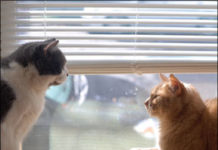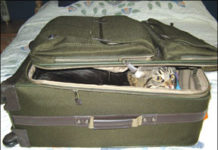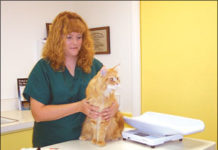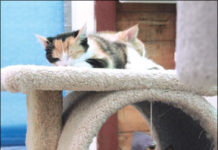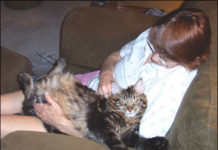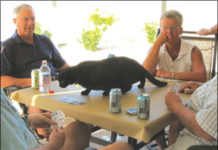Who Are You, Anyway?
Lets be honest: Anyone can have a bad day. Maybe the car wouldnt start. Or you forgot to set the alarm and were late for an important meeting. You might have snapped at a loved one who asked a simple question. When bombarded with an unidentified scary sound, a cat may believe that she is under attack. Perhaps your painter needed to power-wash the deck. Maybe something triggered your neighbors alarm system. Nellie, a nervous kitty, could take refuge in the closet. Or, she may instead attempt to learn the source of the scare. She will take a mental snapshot of the scene. Anything in the picture becomes suspect. Her housemate, Sue, seems a likely culprit. Frightened cats are not reasonable, and fear is a powerful trigger for aggression. Without taking time to recall that Sue has always been a friendly companion, Nellie initiates an attack. Naturally, Sue will be caught off guard. She could fight back, or will probably head for cover. As your day improves, you will probably get back on track. The victim of your ill humor - understanding that your behavior was nothing personal - will still treat you kindly. If only our cats could be as understanding. Sadly, a hiss, growl or swat from a trusted feline companion may set off a cycle of aggressive behavior that can take weeks, months or even years to resolve. Sometimes, an inciting event can clearly be identified. Often, folks come home to find that their cats seem to be at war.
Home Sweet Home … For Your Cat
Sooner or later, most people find themselves moving to a new home. The experience can be daunting for all concerned. Amazingly enough, as long as they have their special people, most cats seem to adapt to new surroundings with no trouble at all. Still, a little prior planning can smooth the way. Lets examine some potential problem areas. It is of course both normal and desirable for a cat to explore a new environment. A bit of care must be taken so that one does not lose ones cat. Take time to block any openings that would allow a cat to reach areas that you yourself could not access should the need arise. Otherwise, you could find yourself cutting holes in sheetrock, disconnecting your home theatre or even removing plumbing fixtures to retrieve a frightened feline. In fact, if your new home is quite large, you might want to use gates or doors to initially limit the areas that your cat can access without supervision. Offer an assortment of cat-friendly mats and perches in these areas. As you offer access to more areas of the house, begin to move these familiar beds to the new locations. Do scan each new area for any toxic materials or other dangerous situations.
Cat Play: An Essential Part of Her Care
Play is an intriguing behavior. Scientists even speculate on its function. Since all species seem to engage in play on some level, it must fulfill an important need. It might prepare youngsters for future tasks such as hunting or fighting. It certainly serves to refine communication skills between participants, and it offers an opportunity for aerobic exercise. But the main reason we play is quite simply that playing is, by definition, fun. Play is a treat that we can and should offer to our cats. Naturally we cannot engage in precisely the same games that cats play with one another. What is the best way to provide play? The first step is to establish some ground rules. No one should get hurt or be frightened. If a cat hisses, bites, or runs away, then the game should be discontinued. Another important rule is that human body parts should not be used as substitutes for toys. That is to say, a cat should not be encouraged to grab or chase hands, fingers or legs. A pony tail is not a toy. The bottom line is that cats cannot help the fact that they are predators. The drive to hunt is a powerful one, and even the most sophisticated housecat can become a skilled huntress at the sight of a tiny mouse. It is not at all uncommon for cats to stalk hands or legs or to pounce forcefully onto a long braid. Even with absence of malice, harm can be done. An ounce of prevention will serve you well. Encourage your cat to play with appropriate toys.
Teaching Your Old Cat New Tricks
We have all heard the popular phrases that support the notion that cats cannot be trained. Tee shirts remind us that "dogs come when called - while cats take a message and get back to us." When a dog is not particularly obedient, he is said to be "more like a cat than a dog." Yet we all know that cats are intelligent and quite capable of learning. In fact, people have successfully trained fruitflies and fish. Perhaps the misconception arose because old-fashioned training strategies which rely on coersion are generally ineffective when used on cats. On the other hand, reward-based training methods are both effective and fun. When an animal (even a cat) is rewarded for demonstrating a particular behavior, he will repeat the behavior in the future. That is the principle of positive reinforcement. A reward-based training technique requires that you find a reinforcer that is truly rewarding. What is your cats pleasure? Is there a treat so delectable that your cat would be willing to jump through a hoop, literally, just for a taste? Consider not only commercial cat treats, but fresh food instead. Morsels of meat, fish, cheese or even cantaloupe can be tested as potential reinforcers.
Is Your Aging Cat Seeking Attention?
These days, despite what we like to consider modern conveniences, people commonly complain that they just cannot find the time to get a good nights sleep. So much to do, so little time. When we finally do settle into bed, we like to be left to our dreams, undisturbed until the alarm takes us to tomorrow. Noisy neighbors, construction crews and barking dogs are beyond our control. But, what an unexpected, and unpleasant, surprise to be awakened by ones own cat! Restless behavior may be particularly hard to understand when your cat has spent the first 12 years of his life refusing to leave the covers until a decent sunbeam appears. The first time that a senior cats cries call a person from sleep, there may be a sympathetic response. A naturally concerned owner might check the food supply. The next occurrence will be more puzzling. Clearly the cat is not wanting for food. Could there be another cat in the yard? Maybe a critter got into the house?
Help Calm Anxiety at the Vet’s Office
Isnt it remarkable that most cats are well-behaved when they visit their veterinarians? First, they are captured and put into an automobile. They remain in their containers, sheltered but helpless, in a room filled with the scent of unfamiliar cats, humans and even dogs. Finally, every bit of security is lost when the cat is removed from its newfound shelter and the veterinary team places the cat on the examination table. Why do cats behave so nicely? Fear can sometimes render a cat motionless and therefore cooperative. Fearful cats - whether immobile or aggressive - can benefit from a behavior modification specifically designed to address high arousal. But what about the average cat, dare I say the "normal" cat? There may be no indication for intensive therapy or anxiety-reducing medication. But clearly, the veterinary experience is not entirely stress-free. Rather than take a cats good behavior for granted, why not reduce some of the stressors that can occur during a visit to the veterinary hospital? Lets examine some components of the visit that could trigger anxiety.
Are Your Cats Compatible Companions?
Once upon a time, cats were considered to be solitary creatures. Since they hunted alone rather than in packs, it was assumed that they preferred to be alone. As it turns out, some cats do indeed avoid the company of others. Yet even more cats clearly choose to remain close to fellow felines. They snuggle and groom and maintain proximity even when there are plenty of comfortable, safe resting places nearby. Unfortunately, there is no reliable way to predict whether an individual kitten will mature into a cat that seeks rather than shuns companionship. When two kittens are adopted together, particularly when they are siblings, the expectation is that they will benefit from one another. Initially, most kittens do play together, groom one another and share a bed. Even as their second birthday passes, all may seem well.
Does Your Beloved Cat Bite?
It is safe to say that most people live with their cats without much concern about getting bitten. Alas, cats have been known to try to bite veterinarians and animal handlers. Frightened animals bite. But why do cats sometimes bite the people they live with? At times, the motivation for aggressive behavior is clear. Yet there are also situations where aggression is just plain difficult to understand. Cats may behave aggressively during procedures such as grooming or nail clipping. A certain degree of restraint is needed to perform these manipulations. Since cats feel trapped when restrained, they may struggle or bite. It may be possible to prevent the development of fear related to handling by conditioning young cats to accept gentle restraint. Early introduction to grooming may be paired with treats.
When Your Cat Plays Favorites
When a cat forms a strong attachment to one fellow cat in the household while actively avoiding another, we chalk it up to personality preferences. As long as no one is injured, we do not complain. It is a cat of a different color, however, that fancies one human while consistently avoiding another family member. Why should this happen? When a couple goes to a shelter to adopt a cat, they of course select one that appears friendly and interacts with both of them. Once the cat is brought home, both owners commonly take turns feeding, grooming, playing and snuggling with their new family member. Yet somehow, a cat may take to following only one member of the couple. What is the reason for this biased bonding? Perhaps one person is loud or large in stature. The less-favored person may simply spend less time at home. There might even be a scent that disturbs the new adoptee.
Coping With Inappropriate Urination
One of the most frustrating feline behaviors that cat lovers endure is urination outside the litter box. In some cases, the cat has issues with the box. Cats may select litter materials or locations based on their own convenience, disregarding any resulting inconvenience to the people who share their household. Fortunately, with a bit of detective work and perhaps some flexibility on the part of the family, most litter box issues can be resolved. The cat that uses his litter box regularly - yet deposits additional urine in assorted areas - is a cat of a different color. When such behavior occurs, the first consideration should be that the cat might be ill. A thorough examination with urinalysis is in order. Confirm that the cat has been neutered. Cats adopted late in life might require a blood test for added assurance.
The High-Maintenance Cat
Have you ever thought that your cat was hyperactive? Can a cat really suffer from hyperactivity? It seems that indoor cats are inclined to expend energy based on the schedules of their families. When people sleep, cats sleep. People move about, and cats follow. Well, maybe they follow. On a sunny day, a cat might elect to extend his nap rather than stroll along. Although it is common for house cats to engage willingly when offered an opportunity to play, they are generally ready to return to rest when the computer or television set is turned on. But it is not uncommon to encounter a cat that is just a bit busier. This would be the cat that nearly always joins in the household activity. When the shower is in use, this cat will play with the curtain. As his people wash and shave, the busy cat bats the water. And no open newspaper or computer keyboard is without a pair of paws.
Safely Leash Train Your Cat
Our lives with cats are usually quite personal and private. While many people adopt a dog to have a walking or hiking companion, cats are more often left at home to greet us after our day is done. In fact, some people feel that it would be degrading to ask a cat to wear a leash and harness. True, a cats elegance and grace might be hampered with a restraint device of any type. Yet there are many reasons to consider teaching your cat to tolerate a leash. For example, a leash is very often included as part of a behavior modification tool box. It can be used to facilitate the introduction of new pets as well as new people. Certain desensitization protocols rely on a leash for smooth and safe implementation. Another great benefit is that a leash-trained cat makes a wonderful sunbathing companion. Although I would not recommend falling asleep with a cat attached to your side, the leash will certainly allow the two of you to relax in the safety on your patio.






